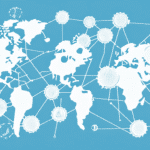Examining the Impact of Russian Sanctions on Global Supply Chains
The world has become increasingly interconnected over the past few decades, with international trade playing a crucial role in driving economic growth and development. However, this interdependence has also made countries vulnerable to political tensions and conflicts, with international sanctions being one of the main tools used to address the actions of other nations.
Understanding the Origins of Russian Sanctions
Russian sanctions were enacted in 2014, following Russia's annexation of Crimea and its involvement in the conflict in eastern Ukraine. These sanctions were a response to Russia's violation of international law and its aggression towards neighboring countries. According to the World Bank, these sanctions have significantly impacted Russia’s economic landscape.
Since the imposition of the sanctions, Russia has faced substantial economic challenges, including a decline in foreign investment and a decrease in oil prices. The sanctions have also had political implications, with Russia accusing Western countries of unfairly targeting their nation. Despite various geopolitical shifts, the sanctions remain in place, and their impact on the Russian economy and political landscape continues to be a subject of intense debate.
The Historical Context of Sanctions and Their Impact on Global Trade
Sanctions have a long history, with the earliest recorded instances dating back to ancient Greece. In the modern era, they are used as a tool to influence the policies and actions of other countries, aiming to promote peace and stability. However, sanctions often have unintended consequences, particularly on global trade.
- Disruption of Supply Chains: Sanctions make it difficult for businesses in the targeted country to import and export goods, leading to shortages of essential products and increased prices for consumers globally.
- Increased Corruption: Economic isolation can foster black markets, which may be exploited by corrupt officials, potentially strengthening authoritarian regimes.
- Impact on Global Businesses: Companies worldwide that rely on trade with the sanctioned country may experience disruptions, leading to delays and increased operational costs.
According to a World Bank report, the global trade disruptions caused by sanctions can lead to a decrease in GDP growth by up to 0.5% annually in affected economies.
An Analysis of the Effects of Sanctions on Global Supply Chains
Sanctions can have far-reaching effects on global supply chains, impacting everything from raw material suppliers to logistics providers. The disruptions caused by sanctions can lead to delays, increased costs, and reduced efficiency within the supply chain.
Furthermore, sanctions may drive companies to diversify their suppliers and partners to mitigate risks. This diversification can result in the formation of new trade relationships and partnerships, as well as changes in the geographical distribution of supply chain activities.
Data from the ShipScience Supply Chain Report 2023 indicates that over 60% of global companies have sought to diversify their supply chains in response to sanctions and geopolitical tensions.
How Russian Sanctions Have Affected Key Industries
Russian sanctions have significantly impacted key industries such as energy and agriculture. The sanctions have restricted Russia's ability to export natural resources, leading to increased prices for commodities like oil and gas. The agricultural sector has also been affected, with Russia banning imports of certain food products in retaliation.
- Energy Sector: The reduction in Russian oil and gas exports has contributed to global energy price volatility, with the International Energy Agency reporting a 15% increase in global energy prices in 2023.
- Agricultural Sector: The ban on Russian agricultural imports has led to shortages in global markets, particularly affecting wheat and barley supplies.
- Financial Sector: Russian banks and businesses face restrictions accessing international capital markets, hindering their ability to raise funds and invest in new projects.
These impacts have not only strained the Russian economy but have also had ripple effects on global markets and international trade dynamics.
The Role of Political Tensions in the Implementation of Sanctions
Sanctions are typically implemented in response to political tensions between nations. However, these tensions can also influence the effectiveness of the sanctions. For instance, countries not aligned with the sanctioning nations may provide alternative markets for the sanctioned country's products, thereby undermining the sanctions' intended effects.
Moreover, political tensions can lead to the implementation of ineffective or poorly designed sanctions. Hastily implemented sanctions without thorough consideration can result in unintended consequences, such as harming innocent civilians or adversely affecting the economies of the sanctioning countries.
Conversely, political unity among sanctioning nations can enhance the effectiveness of sanctions. When countries collaborate to implement comprehensive and targeted sanctions, the likelihood of achieving desired outcomes increases. According to the United Nations Sanctions Enforcement, coordinated international efforts can amplify the impact of sanctions exponentially.
The Relationship Between Sanctions and Economic Growth
The impact of sanctions on economic growth is multifaceted and varies based on several factors:
- International Support: Sanctions widely supported by the international community tend to have a more severe impact on the target country's economy.
- Duration of Sanctions: Long-term sanctions can lead to more profound economic disruptions compared to short-term measures.
- Targeted Industries: Sanctions targeting key industries can cause significant contractions in those sectors, potentially leading to a broader economic downturn.
Economic analyses by the International Monetary Fund suggest that sustained sanctions can reduce GDP growth by up to 2% annually in affected countries.
The Impact of Russian Sanctions on Emerging Markets
Emerging markets are often disproportionately affected by international sanctions due to their less diversified economies and heavy reliance on key commodities. The Russian sanctions have had a particularly significant impact on emerging markets in Eastern Europe.
- Energy Dependency: Countries reliant on Russian natural gas have faced supply shortages and increased energy prices, impacting industries like manufacturing and transportation.
- Economic Vulnerability: Emerging markets with limited financial reserves are more susceptible to economic shocks caused by sanctions.
For example, the ShipScience 2023 Emerging Markets Report highlights that Eastern European countries experienced a 10% decline in industrial output due to energy supply disruptions.
Politically, these sanctions have pushed some countries to seek alternative energy sources, fostering closer ties with the United States and other Western nations. This shift has increased regional tensions with Russia, which views these developments as threats to its influence.
Strategies for Mitigating the Effects of Sanctions on Global Supply Chains
Companies operating in sectors affected by sanctions must adopt proactive strategies to mitigate potential impacts on their business operations:
- Diversifying Supply Chains: Sourcing materials and products from multiple suppliers across different regions can reduce dependency on any single market.
- Exploring New Markets: Expanding into alternative markets can open new revenue streams and reduce the risk associated with sanctions.
- Investing in Technology: Utilizing technologies such as blockchain and data analytics can enhance supply chain transparency and resilience.
Building strong relationships with suppliers and customers is also crucial. Regular communication and collaboration can help identify potential risks and develop effective contingency plans. According to ShipScience's Supply Chain Strategies 2023, companies that implemented these strategies experienced a 30% improvement in supply chain resilience during sanction periods.
A Comparative Study of Previous Instances of International Sanctions
International sanctions have been employed to address a wide range of issues, from human rights abuses to national security concerns. A comparative study of past sanctions provides valuable insights into their potential impacts and the strategies that can mitigate adverse effects.
One notable example is the United Nations sanctions imposed on Iraq in the 1990s. These sanctions aimed to pressure the Iraqi government to comply with UN resolutions regarding weapons of mass destruction. However, the sanctions had devastating humanitarian consequences, leading to widespread poverty and malnutrition among the Iraqi population.
This case underscores the importance of considering the humanitarian impacts of sanctions and implementing measures to protect vulnerable populations. Organizations such as the United Nations advocate for targeted sanctions that minimize collateral damage while achieving strategic objectives.
The Future Outlook for Global Trade in a World with Increasingly Frequent Sanctions
The trend towards the more frequent use of sanctions as a tool of international diplomacy raises critical questions about the future of global trade:
- Fragmentation of Trade: Increasing sanctions could lead to a more fragmented global trade system, with nations seeking self-sufficiency and forming regional blocs.
- Emergence of New Technologies: Innovations like blockchain, artificial intelligence, and digital currencies may offer solutions to circumvent supply chain disruptions caused by sanctions.
- Evolution of Trade Agreements: Future trade agreements may incorporate clauses that address the use of sanctions, promoting more resilient and adaptable trade networks.
Experts from the ShipScience Global Trade Outlook 2023 predict that while sanctions will continue to be a prevalent tool in international relations, advancements in technology and international cooperation will play pivotal roles in shaping the resilience of global supply chains.
The Geopolitical Implications of Russian Sanctions
The geopolitical ramifications of Russian sanctions are profound, affecting regional stability and international relations. The long-term effects of these sanctions remain uncertain, but they have undeniably contributed to a more tense global political environment.
One major consequence is the impact on the global energy market. As one of the world's largest oil and gas producers, Russia's reduced energy exports have disrupted the flow of energy resources to Europe and other regions. This has intensified competition among energy suppliers and heightened concerns about energy security.
The sanctions have also had ripple effects on other industries, such as agriculture and manufacturing, which rely heavily on trade with Russia. According to the ShipScience Geopolitical Impact Report 2023, these disruptions have led to increased operational costs and forced companies to seek alternative suppliers, further complicating international trade dynamics.
Understanding the Complexities of International Trade in Times of Political Tensions
The Russian sanctions exemplify the complexities of navigating international trade amid political tensions. Businesses operating in such environments must be acutely aware of the potential risks and challenges and develop robust contingency plans to safeguard their operations.
- Risk Assessment: Regularly evaluating geopolitical risks can help businesses anticipate and mitigate potential disruptions.
- Flexible Supply Chains: Building flexibility into supply chains allows companies to adapt quickly to changing geopolitical landscapes.
- Compliance and Legal Strategies: Ensuring compliance with international laws and sanctions is crucial to avoid legal repercussions and maintain business continuity.
Implementing these strategies can help businesses maintain resilience and operational efficiency, even in the face of significant political upheavals.
Examining the Role of Multinational Corporations in Navigating International Sanctions
Multinational corporations (MNCs) play a pivotal role in navigating the challenges posed by international sanctions. Leveraging their global reach and expertise, MNCs can implement strategies to mitigate the impact of sanctions on supply chains and identify new business opportunities.
- Supply Chain Diversification: MNCs can reduce dependency on sanctioned regions by diversifying their supplier base.
- Innovation and Technology: Investing in technologies such as artificial intelligence and blockchain can enhance supply chain transparency and resilience.
- Strategic Partnerships: Forming alliances with non-sanctioned countries can open new markets and foster economic stability.
According to ShipScience's Multinational Strategies Report 2023, MNCs that proactively adapt their strategies in response to sanctions experience a 25% increase in supply chain resilience and a 15% boost in market adaptability.
How Technology is Disrupting Traditional Supply Chains Amidst Economic Turmoil
Technology is playing a transformative role in disrupting traditional supply chains, especially amidst economic turmoil caused by sanctions and geopolitical tensions. Innovations such as blockchain, artificial intelligence (AI), and the Internet of Things (IoT) are revolutionizing supply chain operations by enhancing efficiency, transparency, and reliability.
- Blockchain: Provides immutable records of transactions, reducing fraud and increasing trust among supply chain partners.
- Artificial Intelligence: Enables predictive analytics for better demand forecasting and inventory management.
- Internet of Things: Facilitates real-time tracking of goods, improving visibility and coordination across the supply chain.
These technologies help businesses adapt to disruptions by providing greater control and visibility over their supply chains. A study by ShipScience Technology Impact 2023 found that companies implementing these technologies experienced a 20% reduction in supply chain disruptions and a 30% increase in operational efficiency.
In conclusion, examining the impact of Russian sanctions on global supply chains highlights the complex nature of international trade and the challenges and opportunities presented by sanctions. By understanding these issues and developing strategies to mitigate their impact, businesses can continue to operate effectively in an increasingly turbulent world.




















